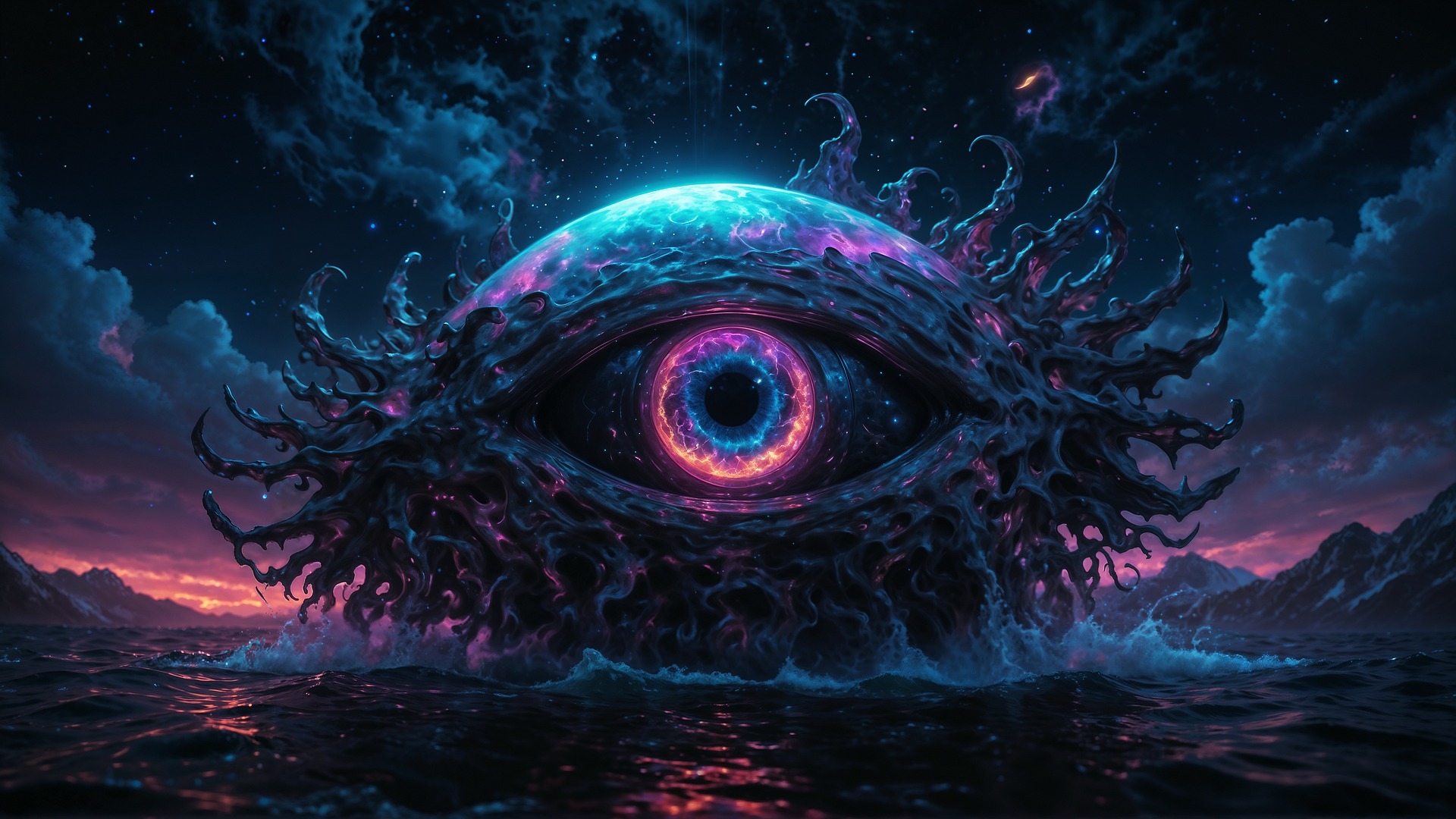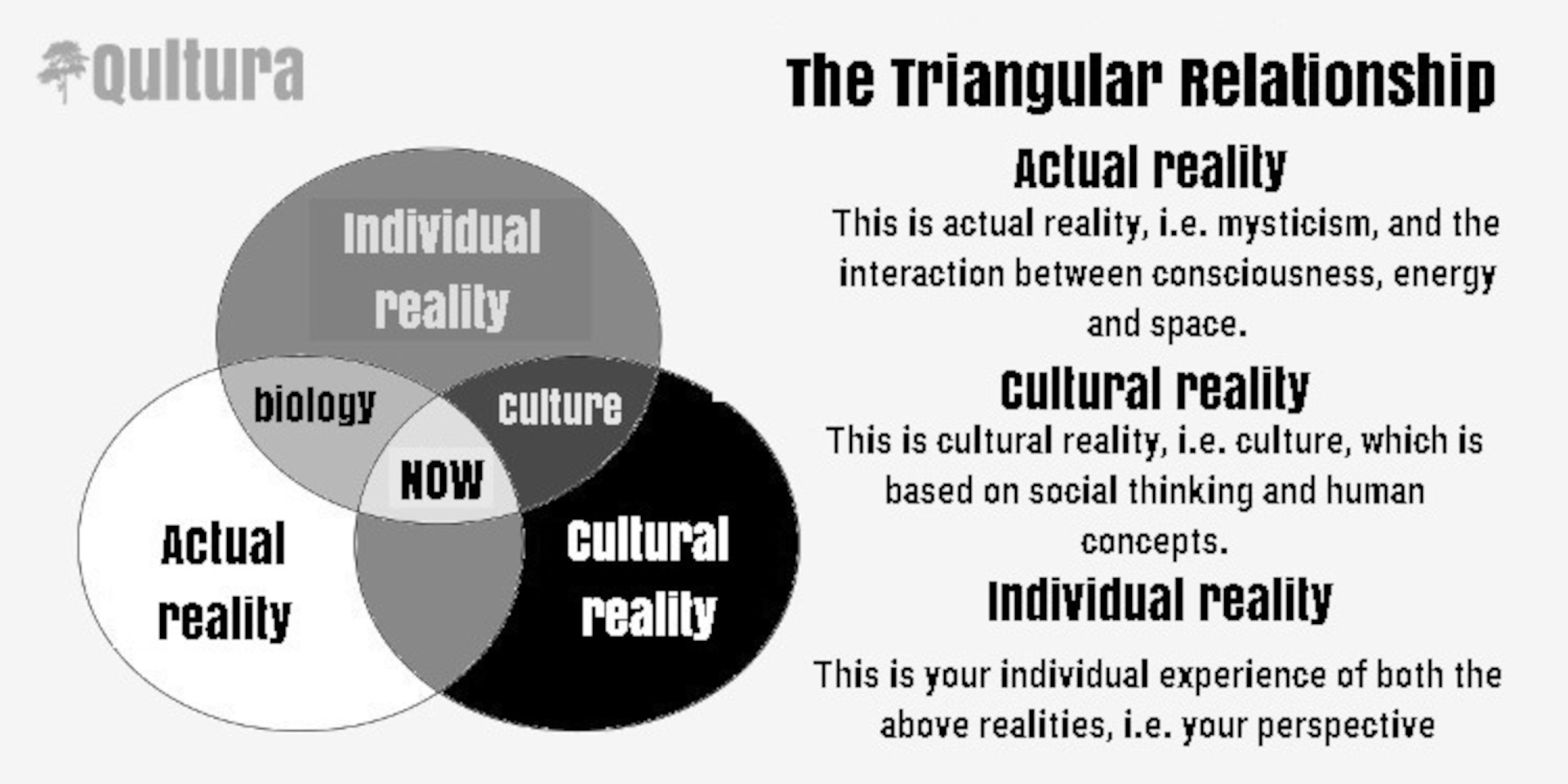
The mystical experience
A few people have asked me to write about the mystical experience. This I am willing to do of course, but to understand the mystical experience for what it is we need to understand what reality is. This is what I want to get into in this post so if you read this you should get an insight into both reality and also the mystical experience.
What is reality?
See the problem I have here is that how I would define a mystical experience is pretty much the same as most people would define reality.
But see while there is a discussion on what is reality and what is illusion, and what is actual reality and what is just a hallucination, there's not much in the way of a consensus. There cannot be a consensus because reality cannot be explained, defined or understood just as existence cannot be defined, explained or understood.
All we have are words and concepts, because language is the central human reference point of life and existence. But see reality is not a concept, the universe is not a concept, life is not a concept, and so on.
So what I'm going to do is give you a frame of reference by giving you some simple definitions of reality.

When developing Qultura I developed a universal principle known as the Triangular Relationship, illustrated above, which gives you two basic versions of reality. These two different versions of reality merge into your individual reality, i.e. that reality which is experienced by you through the Felt Sense of Immediate Experience (which I will come to a little later).
Now please keep in mind here that your individual reality is made up of the mystical experience. But let me get this frame of reference out of the way so we can understand how this is so.
Below I give you three definitions of reality together.
-
Actual reality
Actual reality is any reality which is not created by human thinking or human imagination but which is also actual, i.e. it exists in the present moment and here and now.
Examples of actual reality include the sky, the universe, a tree, this planet, an involuntary action such as a sneeze, and so on.
-
Cultural reality
This is also known as conceptual reality and this is the reality created from human thinking and human imagination. Note that this also involves what we understand to be virtual reality.
Examples of cultural reality include money, time, sciences, countries, nations, economics, art, music, drama, and anything else that can be defined as a concept.
-
Objective reality
Objective reality is essentially the reality of objects or things, as we can confer. So we're talking about such things as a house, a car, a mountain, a lake, a road, a building, and so on.
Now what you will notice here is that objective reality can involve both actual reality, i.e. a mountain or a tree, or conceptual reality, such as a chair, a piano, or other conceptually designed object. But what objective reality is usually understood as is three dimensional reality where the space within the dimensions, i.e. the object or thing, is understood to be real.
Perspective
So having gone through reality and what it is we need to now figure out how we arrive at perspective because perspective is the basis of the mystical experience. We develop perspective through the Felt Sense of Immediate Experience.
There's three components of the Felt Sense of Immediate Experience:
-
Perception
Perception is sensory and extrasensory information coming from your environment, i.e. from outside your physical body.
This is different from introception (see below) because you cannot see inside your head or feel what's inside your body, can you?
-
Introception
Introception is the sensation or being corporeal, i.e. inside a body and also all sensory and extrasensory information coming from within your body
As you will notice your senses through introception are different from your perceptive senses such as sight, hearing, smell and taste. Your introceptive senses are such senses as balance, pain, satiation, and so on.
-
Conception
Conception is all to do with sensory and extrasensory information arising out of memory which of course feeds your imagination and ability to conceive or create concepts.
Therefore this has much to do with cognition, recognition and precognition.
Now this is where we get to the important part. We cannot directly perceive reality. All we can do is experience a perspective on reality, and our perspective on reality is always highly individual and unique. In terms of Qultura (the system I developed) perspective is defined as Principle or Core Being and this is always relative to individual reality. The relationship between perspective and individual reality is known as the mystical transaction.
You see you cannot separate perception, introception and conception from each other. They are all interconnected and interdependent on each other. What you can perceive from your environment is dependent to some degree on how you feel within yourself and also what you are able to conceive and recognize. Your focus of conscious attention, which is always narrow and linear, will always provide a context for everything else and it will shape and colour your individual perspective.
You cannot experience anything outside of your Felt Sense of Immediate Experience. You are also not any more consciously aware or aware of consciousness (which is both existence and information) than you are able to conceptualize and verbalize into language. But see you can also believe that you have experienced something when in actual fact you have experienced something totally different, but at the time you were not consciously aware of that what you were experiencing, and so misinterpreted or mislabelled your experience. This is something I hope I don't need to explain any further to you. Sometimes you can go through an experience but not comprehend or understand it and so it doesn't make any sense to you. Often it requires another completely different experience for you to go through to be able to make sense of your previous experience.
Just as perception merges with introception and conception so that you cannot really separate one from another, the same can be said about reality. What we are led to believe is just reality - in the common understanding accessible to logical understanding - is a vast multitude of different realities which can be actual, conceptual, objective or otherwise. This is why we talk about different levels of reality and planes of consciousness, which are essentially tiny fragments of the sum total of reality. Much of what we understand to be reality is primarily conceptual or cultural reality.
If we were to talk about our modern reality we would be thinking about a reality which is less than a century old and influenced heavily by digital technology. This would be a different reality to say the reality of somewhere like the United States in the 1950's and much of the basis for that reality would have developed in the middle of the 18th and 19th century after the Enlightenment period when we first started to see ourselves as individuals and had a greater definition of self. This in turn would be radically different to say the reality of the Roman Empire or ancient Greeks with their numerous gods, demons and other entities and much less emphasis on objective reality where there was no individuality just families.

Understanding the mystical experience
So if we understand mysticism to be all that what we cannot comprehend or put into words, we can perhaps understand that a mystical experience is something which takes us beyond our limitations of conscious awareness. It's any experience which we feel to be real in some sense but which is not part of our individual perspective, but lies somewhere beyond it.
Let me give you some examples here...
-
a hallucination
If I were to get you to consume a psychedelic drug, say 20mg of DMT, you would probably have a mystical experience based on a hallucination. If you were to take magic mushrooms you would have a different mystical experience based on a different hallucination. Likewise if you went through a ritual involving ayahuasca, you will have another mystical experience based on yet another hallucination.
Here we could surmise that the hallucination which resulted in the mystical experience was caused by the taking of a psychedelic substance which distorted our introception and it is this distortion of introception through which we have a mystical experience. But what if there's no trip, no hallucination and no mystical experience? Then what?
-
a dream
Another example of a mystical experience are dreams which we experience during sleep. A particularly vivid dream is a mystical experience and it can also be a hallucination. Note that this is not in any way chemically induced, or maybe it is if you've eaten a particular type of cheese before bedtime.
-
a schizophreniform
A schizophreniform is an example of a mystical experience which can arise out of a mental health issue, such as a psychotic episode and appear as reality even though it is a hallucination or vision.
Similarly it is possible to go through a mystical experience through PTSD or a major depressive episode. In many cases of what we call clinical depression layers of perspective become lost which affects perception, introception and conception.
-
a paranormal experience
Another form of mystical experience occurs during a paranormal experience which may happen as a one off event, or which may happen repeatedly, or which may happen to one person or be experienced by a number of different people.
It's important to understand and recognize the fact that a paranormal experience isn't just about hearing noises, or voices, or seeing spirit forms or ghosts. It's enough that you get what I call a fifth dimensional experience to affect your perception, introception or conception enough to give you a different sensation or 'vibe' about a specific situation, place or set of circumstances. You see things differently or feel differently but cannot explain why.
Not all mystical experiences are big, all encompassing visions or hallucinations. Some are very subtle and even barely perceptible.
-
a Near Death Experience (NDE)
Probably the best example of a mystical experience, and one which has been recorded for centuries consistently across many different cultures and societies, is the Near Death Experience (NDE) from people who have been extremely close to death or who have even experienced what we understand to be clinical death.
What we cannot say for sure is whether we actually move into another dimension or field due to the loss of the fifth dimension. Many people go through such mystical experiences and can spend years or even decades struggling to put such experiences into words and bring the mystical experience into perspective. The 1975 song by Electric Light Orchestra 'Can't Get It Out Of My Head' is believed to be about a mystical experience.
But if we shift our perspective and embrace reincarnation, so that we see death not as the event which ends a life but which is the event which starts our life, perhaps we can start to see a different relationship to the mystical experience. It does not really matter if this event we call death happens at the end of life, as we commonly believe, or preceding life, as I suggest, we're still talking about a point on a circle (the life cycle) where the ending is also the beginning. If death precedes life, rather than succeeding it, then surely life after death is what we are living, and the mystical experience we go through during death forms some kind of basis to what we understand to be perspective.
There was once a neo-Platonic philosopher who described the the mystical experience as 'the flight of the alone to the alone'. What I want to point out here is that if there is such a thing as ultimate reality, the reality beyond all other realities out there, or The Void (sunnata in Buddhism) then surely it has to be the mystical experience.
This means that ultimate reality is a mystical experience which is unique and individual to you. This experience is based on things which you have never seen before, you see things which no one else has seen before, but you also see things which nobody else or you will ever see again. Now how you deal with the mystical experience depends on you. Personally as a Cancer with rising Virgo Moon and third house Neptune in Scorpio I prefer to do my mystical work incognito and bring my insight back to community. But how can we tap into the mystical experience and bring it back into perspective? The answer for me lies in diversification, individuation, and placing a lot less stock in objective reality.
You see I'm a great advocate of striking a balance or what I would refer to as a balanced perspective. It's pointless going through life with some model of reality based on some belief system or ideology, not allowing for either individual perspective or the non-rational or meta-physical. The whole point of life is to become a fully developed mature human being, just as an oak tree becomes a fully grown oak tree and a caterpillar becomes a butterfly. I have already pointed out that reality changes, and it changes a lot, because reality is subjective, and reality and what we understand to be reality has changed consistently throughout human history. It makes no sense to try and cling to it as many people do.
Much of what life is really all about - and I'm currently writing a book about this - is finding ways of making sense of what's going on. The key to life is really all neatly in that phrase, 'making sense' because that is what always brings you back to perspective and how you comprehend not just yourself but also everything around you. Therefore if you are wondering about the mystical experience and what to do with it what I'd like to suggest is find ways of using it to connect to others and the environment or world around you.
